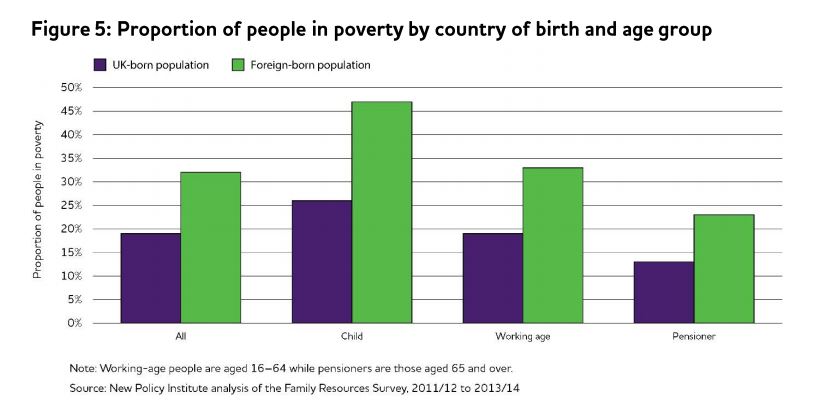About the research
This research was commissioned by the Joseph Rowntree Foundation (JRF) to find out about the experience of poverty for people who have moved to the UK. Carried out by Ceri Hughes and Dr Peter Kenway from the New Policy Institute and published in July 2016, this research used the Family Resources Survey to analyse migrants’ experiences of poverty and to compare them with the experiences of UK-born people.
Public understanding about the people who migrate to the UK is often reported solely in terms of the number of people coming in and out of the country and the impact this has on resources and public services. Although the plight of vulnerable asylum seekers arriving in the UK receives more attention, little research has been carried out on the poverty levels of the overall migrant population of the UK. This research was commissioned to give a broader view on poverty and to help inform policy decisions on poverty in the UK.
The research found that there were on average 7.7 million foreign-born people living in the UK between 2011 and 2014, with the vast majority of them being adults. Those moving to the UK tended to be young adults, who arrived between the ages of 16 and 30, and most of the foreign-born population were of working age. Whilst the poverty rate for the UK-born population is 19%, the poverty rate for the foreign-born population was much higher at 32%.

The report authors suggest several possible reasons for this difference in poverty levels, including the following:
- migrant families having a higher proportion of one adult working and one not working, compared to UK-born families, where one person works full time and another part-time. This could highlight different culture value in female participation in the labour market – women who were nationals of non-EU countries tended to have lower rates of economic activity.
- a greater proportion of foreign-born people living in the private rented housing sector – 40% of migrants, compared to 15% of UK-born people.
- the age of foreign-born people when the arrive in the UK, with more than half arriving in the UK aged between 16 and 30. These individuals may not have acquired qualifications or accessed education which is recognised in the UK, which could limit their employment prospects.
Methodology
This research analyses data collected between 2011/12 and 2013/14 by the Family Resources Survey, a continuous survey that was launched in 1992 to meet the information requirements for the Department for Work and Pensions. The study also uses the Households Below Average Income (HBAI) data series derived from the Family Resources Survey which charts household disposable incomes, after adjusting for the household size and composition, as a measure for material living standards. More precisely, it is a measure for the level of consumption of goods and services that people could attain given the disposable income of the household in which they live. In order to allow comparisons of the living standards of different types of households, income is adjusted to take into account variations in the size and composition of the households in a process known as equivalisation. A key assumption made in HBAI is that all individuals in the household benefit equally from the combined income of the household. This enables the total equivalised income of the household to be used as a proxy for the standard of living of each household member.
Findings for policy:
The report shows that, on average over the three year period to 2013/14:
- there were 7.7 million foreign-born people living in the UK (12.3% of the total population);
- 2.5 million foreign-born people were in poverty (32% of all foreign-born people) – this contrasts with a poverty rate of 19% for UK-born people;
- most (73%) of the foreign-born population who were in poverty had lived in the UK for at least five years;
- the poverty rate for children with foreign-born parents was high; reaching 45%, compared with 24% for the children of UK-born parents;
- most (70%) of the children in poverty who lived in foreign-born adult families were born in the UK.
The report particularly highlights two groups that policy intervention could help, children of foreign-born parents, who have a poverty rate of almost double that of children who have UK-born parents, and migrants who stay in the UK for several decades. The difference in living standards between UK-born people and long-term migrants to the UK suggests that even though they have been resident in the UK for many years, this group are still facing barriers to accessing the support and opportunities that UK-born people view as normal.
The research informed JRF’s comprehensive report, UK poverty: Causes, costs and solutions, which presents the evidence for JRF’s strategy to solve UK poverty.
Read the report:
Hughes, C. and Kenway, P. (2016) Foreign-born people and poverty in the UK. York: Joseph Rowntree Foundation. Available at: https://www.jrf.org.uk/report/foreignborn-people-and-poverty-uk.
